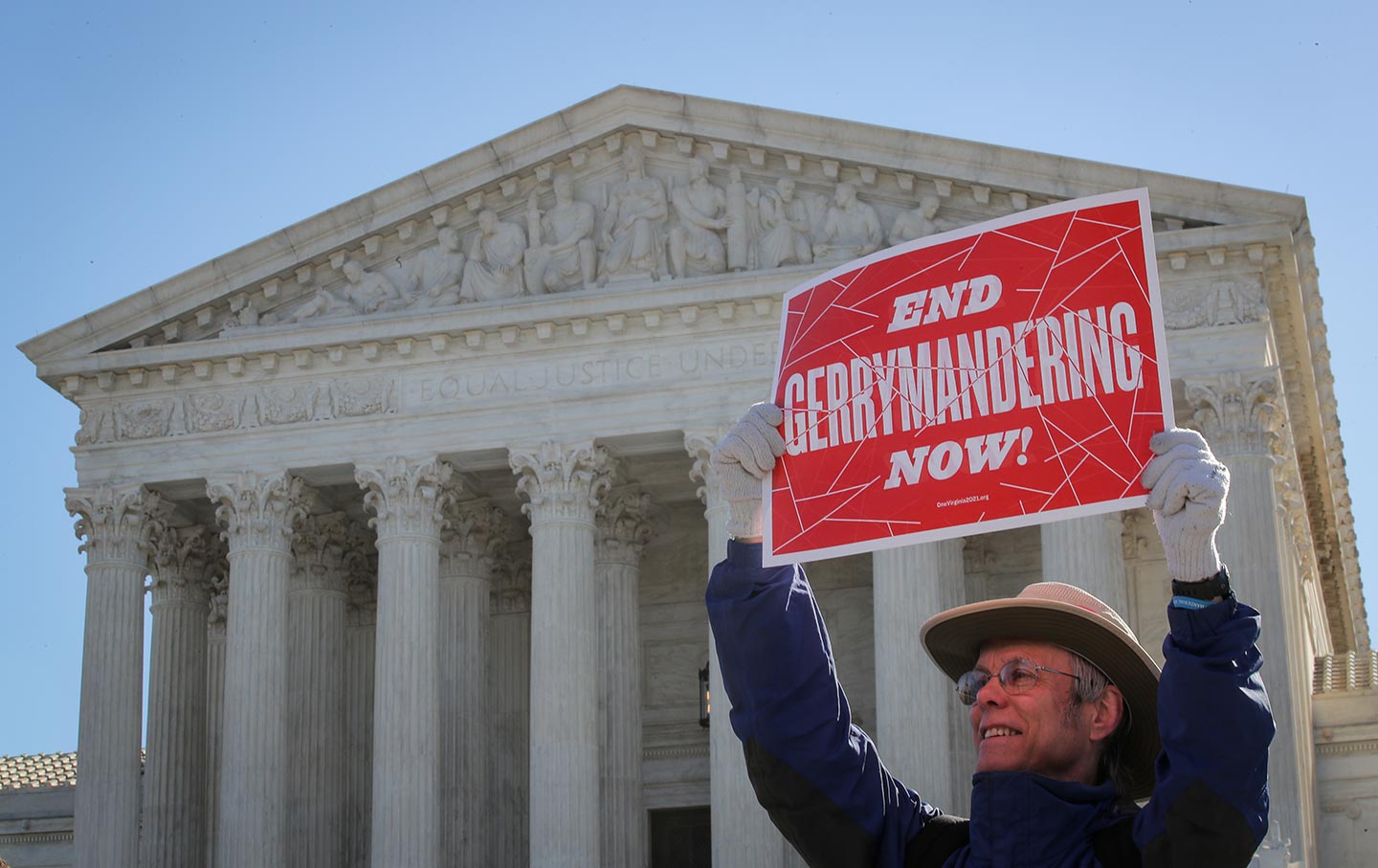Gaza Is on the Ballot All Over America
Inspired by Michigan’s unexpectedly high “uncommitted” vote, activists across the country are now mounting campaigns to send Biden a pro-cease-fire message.

A pro-Palestine protest in Seattle on November 24, 2003.
(Chin Hei Leung / Sipa USA via AP)Joe Biden did not directly acknowledge the fact that one out of every seven Michigan Democrats who cast ballots in that state’s February 27 presidential primary skipped over his name and voted “uncommitted” in response to a last-minute campaign to get the president to end US support for Israel’s assault on Gaza. But when Vice President Kamala Harris used the dramatic backdrop of Selma’s Edmund Pettus Bridge on Sunday to reiterate the Biden administration’s desire for a six-week cease-fire in the region—after Biden announced plans for limited airdrops of food supplies into Gaza—organizers of the Listen to Michigan movement that secured the unexpectedly high “uncommitted” vote announced, “Despite the naysayers in the establishment, the Biden administration is moving because of the pressure from uncommitted voters.”
That wasn’t a declaration of victory from the activists, who want a permanent cease-fire and an end to US military aid to Israel. But it was an argument that the movement to use primary ballots as a way to demand an end to the death and destruction in Gaza is having an impact—not just on politics but on policy.
The question now is whether more “uncommitted” votes cast in more primaries might infuse Biden and his team with the sense of moral urgency that has been lacking since the government of Israeli Prime Minister Benjamin Netanyahu responded to the October 7 Hamas attack on Israel with a full-scale military assault on Gaza that has killed upwards of 30,000 Palestinian civilians—more than 12,000 of them children. The answer will come from states across the country, where activists have picked up the “uncommitted” banner and are running with it.
More than two dozen states permit voters to cast “uncommitted,” “undeclared” or “no preference” ballots. In each case, if 15 percent of voters statewide, or in individual congressional districts, choose one of these options, they will send delegates with no obligation to back Biden to the Democratic National Convention in Chicago, where they could raise the issue of Gaza.
After months of marches, rallies, and protests, activists say there is now an electoral mechanism for raising the issue, and supporters of an immediate and permanent cease-fire are seizing it as a vehicle to “get a message to Biden” about his moral responsibility to stop the killing—and his political responsibility to listen to constituencies he’ll need to beat Donald Trump in November.
“Finally, we realized the most powerful tool we have in our grasp is the power to vote,” says Rami Al-Kabra, a Palestinian American city council member in the Seattle-area city of Bothell, who is working with Washington state’s “uncommitted” campaign ahead of its March 12 primary.
The Washington campaign gained traction last week, when the executive board of the state’s largest union, United Food and Commercial Workers Local 3000, called for an “uncommitted” vote, stating,
We need a nominee who can run and beat Trump to protect workers across this country and around the world.
We stand in solidarity with our partners in Michigan who sent a clear message in their primary that Biden must do more to address the humanitarian crisis in Gaza.
Biden must push for a lasting ceasefire and ending US funding toward this reckless war.”
In addition to Washington, “uncommitted” campaigns have emerged in several states, including Colorado, Minnesota, Massachusetts, North Carolina, Pennsylvania, Arizona, and Wisconsin. National groups, such as Our Revolution, Progressive Democrats of America, Democratic Socialists of America, and Jewish Voice for Peace Action, are backing the rapidly expanding national effort by more states to replicate the Michigan result.
The Michigan “uncommitted” vote—and its potential influence on the White House—gained significant attention from the media and from commentators on the right and the left. While congressional Republicans, such as US Representative Jim Banks (R-Ind.), griped after Biden announced the airdrops that the president was “basing his foreign policy on a Michigan election,” supporters of Palestinian rights took to social media with messages declaring, “Thank you, Dearborn. Thank you, Michigan primary.”
Dearborn, the city with the largest per capita Muslim population in the US, cast 56 percent of its votes for the “uncommitted” option on the Michigan ballot, while, statewide, the “uncommitted” campaign launched just three weeks before the primary won more than 100,000 votes and picked up two delegates to the DNC.
Biden still won, but the strength of Michigan’s “uncommitted” vote was widely noted even by Biden backers. “One hundred thousand uncommitted voters in Michigan shows the problem with Joe Biden’s current course in Gaza,” observed US Representative Mark Pocan (D-Wis.). “Time to wake up to the growing human rights concerns that many Americans have. And to recognize Netanyahu isn’t the ally some claim he is.”
Popular
“swipe left below to view more authors”Swipe →Asked on CNN if he thought that the Michigan vote was a warning sign for the White House, Senator Bernie Sanders I-Vermont, said, “I think it is. I think people all over this country are looking at what’s going on in Gaza and really cannot believe what they are seeing. It’s not only that 30,000 Palestinians have been killed, and 70,000 wounded—two-thirds of them women and children—but what we are looking at at this moment is the starvation of hundreds of thousands of children. And that is because of Israeli bombardments and that is because of restrictions at the border preventing humanitarian aid from getting in. This is absolutely unacceptable. In my view, and I have said this a million times, the United States should not be giving Netanyahu and his extreme rightwing government another nickel for their war efforts that are killing so many innocent Palestinians.”
It is the hope that Biden can be moved toward that level of clarity that has inspired activists across the country to borrow a page from Michigan and start campaigns like the one in Washington State, which just won the endorsement of Seattle alternative weekly newspaper The Stranger. While the paper’s editors—like many supporters of “uncommitted” campaigns—said they would back Biden over Trump in a November race, they explained, “Joining a movement to vote for uncommitted delegates to support a ceasefire gives us the rare opportunity to speak directly to the president on this issue, and the humanitarian disaster unfolding in Gaza is simply far too dire not to take advantage of that opportunity.”
Disobey authoritarians, support The Nation
Over the past year you’ve read Nation writers like Elie Mystal, Kaveh Akbar, John Nichols, Joan Walsh, Bryce Covert, Dave Zirin, Jeet Heer, Michael T. Klare, Katha Pollitt, Amy Littlefield, Gregg Gonsalves, and Sasha Abramsky take on the Trump family’s corruption, set the record straight about Robert F. Kennedy Jr.’s catastrophic Make America Healthy Again movement, survey the fallout and human cost of the DOGE wrecking ball, anticipate the Supreme Court’s dangerous antidemocratic rulings, and amplify successful tactics of resistance on the streets and in Congress.
We publish these stories because when members of our communities are being abducted, household debt is climbing, and AI data centers are causing water and electricity shortages, we have a duty as journalists to do all we can to inform the public.
In 2026, our aim is to do more than ever before—but we need your support to make that happen.
Through December 31, a generous donor will match all donations up to $75,000. That means that your contribution will be doubled, dollar for dollar. If we hit the full match, we’ll be starting 2026 with $150,000 to invest in the stories that impact real people’s lives—the kinds of stories that billionaire-owned, corporate-backed outlets aren’t covering.
With your support, our team will publish major stories that the president and his allies won’t want you to read. We’ll cover the emerging military-tech industrial complex and matters of war, peace, and surveillance, as well as the affordability crisis, hunger, housing, healthcare, the environment, attacks on reproductive rights, and much more. At the same time, we’ll imagine alternatives to Trumpian rule and uplift efforts to create a better world, here and now.
While your gift has twice the impact, I’m asking you to support The Nation with a donation today. You’ll empower the journalists, editors, and fact-checkers best equipped to hold this authoritarian administration to account.
I hope you won’t miss this moment—donate to The Nation today.
Onward,
Katrina vanden Heuvel
Editor and publisher, The Nation
More from The Nation

The King of Deportations The King of Deportations
ICE’s illegal tactics and extreme force put immigrants in danger.

How Rob Reiner Tipped the Balance Against Donald Trump How Rob Reiner Tipped the Balance Against Donald Trump
Trump’s crude disdain for the slain filmmaker was undoubtedly rooted in the fact that Reiner so ably used his talents to help dethrone him in 2020.

The Economy Is Flatlining—and So Is Trump The Economy Is Flatlining—and So Is Trump
The president’s usual tricks are no match for a weakening jobs market and persistent inflation.

Trump’s Vile Rob Reiner Comments Show How Much He Has Debased His Office Trump’s Vile Rob Reiner Comments Show How Much He Has Debased His Office
Every day, Trump is saying and doing things that would get most elementary school children suspended.




